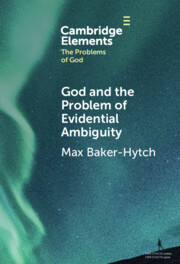God and the Problem of Evidential Ambiguity
Published online by Cambridge University Press:
20 December 2023
- Max Baker-Hytch
- Affiliation:
University of Oxford
Summary
When it comes to what many of us think of as the deepest questions of existence, the answers can seem difficult to make out. This difficulty, or ambiguity, is the topic of this Element. The Element begins by offering a general account of what evidential ambiguity consists in and uses it to try to make sense of the idea that our world is religiously ambiguous in some sense. It goes on to consider the questions of how we ought to investigate the nature of ultimate reality and whether evidential ambiguity is itself a significant piece of evidence in the quest.



